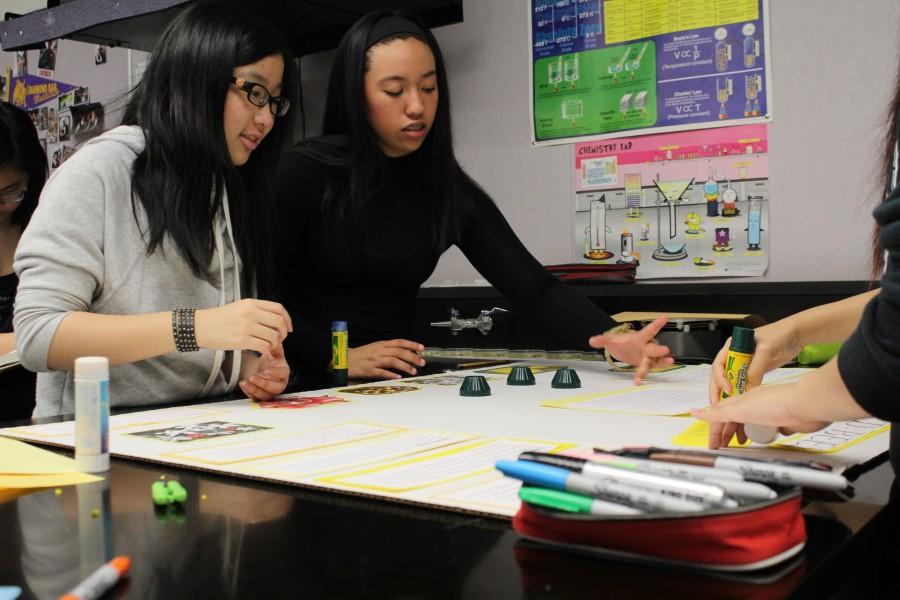Making the DB campus greener
Seniors Karina Kuo (left) and Jessica Gomez work on their project, D-Bees Trees, meant to help honeybees in the area.
Seniors Karina Kuo (left) and Jessica Gomez work on their project, D-Bees Trees, meant to help honeybees in the area.
March 16, 2016
While most STEM classes urge students to focus on technological advances, at Diamond Bar High School, the AP Environmental Science classes aspire to change a part of the campus every year and create a more ecologically friendly world.
Once again, DBHS’ five APES classes, led by teachers Angela Jensvold, Greg Valor and Teresa Herbert, will organize and execute a project that will last for the duration of second semester and will be evaluated in a competition near the end of the school year.
DBHS Lightsavers, Jensvold’s first period class, is focused on making energy efficient changes, such as swapping fluorescent light bulbs with LED lights and installing motion sensors inside classrooms. Due to the fact that the Lightsavers will most likely not accumulate enough money for the every classroom to make these changes, the group plans to focus on classrooms where teachers and electricians state that changes will be the most energy efficient.
“Most people aren’t aware of the issue with energy efficiency and we hope that by introducing this change at DBHS, and us informing and reaching out to the public, it will prompt other schools, businesses, and the community to begin this transition from fluorescent and incandescent lights to LED lights,” senior Lightsavers member Carol Lai said.
On the other hand, Jensvold’s second period class, Electric Motive, is focused on the exterior of DBHS rather than the interior. The students’ goal is to raise money to add one solar panel car-charging station in the parking lot.
The charging station is aimed toward the environment as a whole, allowing students and faculty members to charge their electric vehicles during school hours to push people to start moving away from the diesel and gasoline automobiles.
“It will positively benefit the community because there are not a lot of electric charging stations available in the city of Diamond Bar…” junior Kaitlyn Chao said via Facebook.
Another ecological problem is the enormous waste of water. No Flush Zone, or Valor’s first period class, plans to install waterless urinals to reduce water waste. The goal of their project is to start replacing half of the boys’ restroom urinals to be waterless.
Unlike the other classes’ projects, No Flush Zone will not require funding since they plan on having sponsors donate the urinals. They simply need to get approval from the school district, and the urinals will be installed near the lower lunch quad over the summer.
“Hopefully as the school sees how much money they are saving, they will convert more of the current urinals to waterless urinals,” senior Austin Niu said.
Similarly, Switch it Up, Valor’s fourth period class, aims to reduce water waste and carbon emissions by replacing grass with switch grass, a plant that consumes greater amounts of carbon dioxide than normal grass, therefore decreasing the carbon footprint of Diamond Bar High School.
Switchgrass reduces water excessive water run-off and prevents water from drying up during warmer days. By cultivating switchgrass, the class hopes to do its part in combating the growing issue of global warming. The group would like to plant switchgrass seeds at the front of the school and the plot of land near the tennis courts.
Last is D-Bees Trees, Hebert’s third period class, a project dedicated to raising awareness of the plight of honey bees in the U.S. This unexpected bee crisis is thought to have occurred because of the Colony Collapse Disorder, an unexplained event that occurs where a swarm of bees randomly disappear from its hive.
D-Bees Trees aims to provide multiple oases by planting fruit trees between the 400 building and the baseball field.
“Our APES project is contributing and benefiting to DBHS by changing the mindset of not just students, but of everyone in the community,” senior Kylie Choi, president of D-Bees Trees, said via Facebook.
For most of the classes, fundraising is essential to their projects. Many APES classes fundraised through a PearUp fundraiser, through which students can log in with their Facebook account and complete a series of tasks that only take a couple of minutes, each to raise money for the group. Another common fundraising method was selling tickets at the Anaheim Ice Skating Rinks.
Additionally, D-Bees Trees will be hosting a faculty versus students dodgeball tournament in the gym on Thursday, Mar. 24.
The admission price for entering in the tournament will be three dollars, but watching the game will free. Refreshments will be sold separately.
Having had a year to plan, fundraise, and execute the project, they will enter their programs in a competition near the end of May, which will evaluate the effectiveness and validity of each project.




